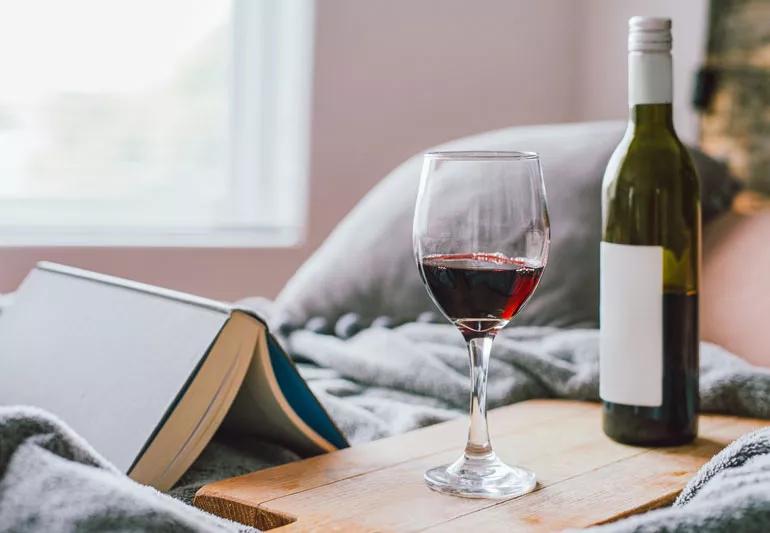Alcohol confuses your brain, irritates your bladder

Sometimes, after a night out, you may have heard of someone wetting the bed or maybe you have first-hand experience with this. Embarrassing as it is, this can happen to anyone. What happens if imbibing leads you to involuntary peeing throughout the night?
Advertisement
Cleveland Clinic is a non-profit academic medical center. Advertising on our site helps support our mission. We do not endorse non-Cleveland Clinic products or services. Policy
Waking up in urine-soaked sheets is not anyone’s idea of a good time, especially if you’re sharing the bed. Urologist James Ulchaker, MD, helps explain what’s going on in your body that’s causing this involuntary bed-wetting after too many drinks.
Nocturnal enuresis, or nighttime bedwetting, can happen when you overindulge because alcohol affects several things in your body that make it more difficult to hold your pee.
We are all equipped with an antidiuretic hormone (ADH) produced by the brain. ADH signals the kidneys to keep them from making too much urine, thereby preventing you from using all of your hydration reserves. Drinking alcohol suppresses ADH production, so your body produces more urine than it normally would.
“When you’re awake, you make up for extra urine by making more trips to the bathroom,” Dr. Ulchaker says. “If you pass out later or are sleeping too soundly, your bladder continues to fill more quickly and gets over-distended. Your body then releases the pressure by urinating,” he says.
But if you’re drinking to excess or late into the night, this suppression of ADH can continue long after you hit the hay. The result is your body is producing a whole lot more urine while you’re dozing than it normally does when you’re sober … which can result in wet sheets.
Advertisement
Alcohol also irritates the detrusor muscle, part of the wall of the bladder that signals when you need to pee. If you’re passed out with inhibitions lowered from a drunken state, you may miss the signals from this muscle and void in your slumber.
The volume you’re consuming might play a role in increasing the amount in your bladder. Sharing a pitcher of beer during a game or dinner with friends adds significantly to the normal amount of liquids you take in.
But add to this the simple fact of when we usually drink alcohol: evening time! This means you’re drinking closer to the normal time you go to bed, and this can dramatically increase the amount of pee your bladder has to hold through the night. This can really be a problem as you turn out the lights, especially if you already have a difficult time holding your pee under normal circumstances.
What’s more, Dr. Ulchaker says drinking alcohol causes your body to pull from its liquid reserves, which can lead to dehydration and add even more volume in your bladder.
But a main factor with your bladder’s involuntary contractions is caffeine, Dr. Ulchaker says.
Remember that muscle in the bladder? The detrusor? Caffeine makes that muscle contract, telling you to pee before the bladder is even full. This allows you to hold less and less urine over time. Because caffeinated beverages so often go hand-in-hand with alcohol (think rum and Coke), this is a double-whammy for your bladder.
Of course, drinking too much alcohol isn’t healthy, especially if it’s affecting your ability to hold your urine on a regular basis. If you have an occasional extra drink or two, there are a few ways to reduce your risk of wetting the bed while you sleep.
Advertisement
Learn more about our editorial process.
Advertisement

Your tolerance decreases with age, thanks to body changes, health conditions and medications you may take

‘Blackout rage gallons’ can lead to dangerous levels of alcohol consumption

An enzyme deficiency or rosacea are potential causes of alcohol flush

ACV may help lower blood sugar and calm acid reflux, but don’t believe all the hype

Yes, grabbing a few beers or a couple of glasses of wine or cocktails with friends can increase your heart rate — dangerously in some cases

Alcohol (in any amount) is a well-known cause of cancer

Forget the myth and answer nature’s call when your bladder feels full

Alcohol provides empty calories, heightens cravings and may slow down your metabolism

Wearing a scarf, adjusting your outdoor activities and following your asthma treatment plan can help limit breathing problems

Your diet in the weeks, days and hours ahead of your race can power you to the finish line

When someone guilt trips you, they’re using emotionally manipulative behavior to try to get you to act a certain way